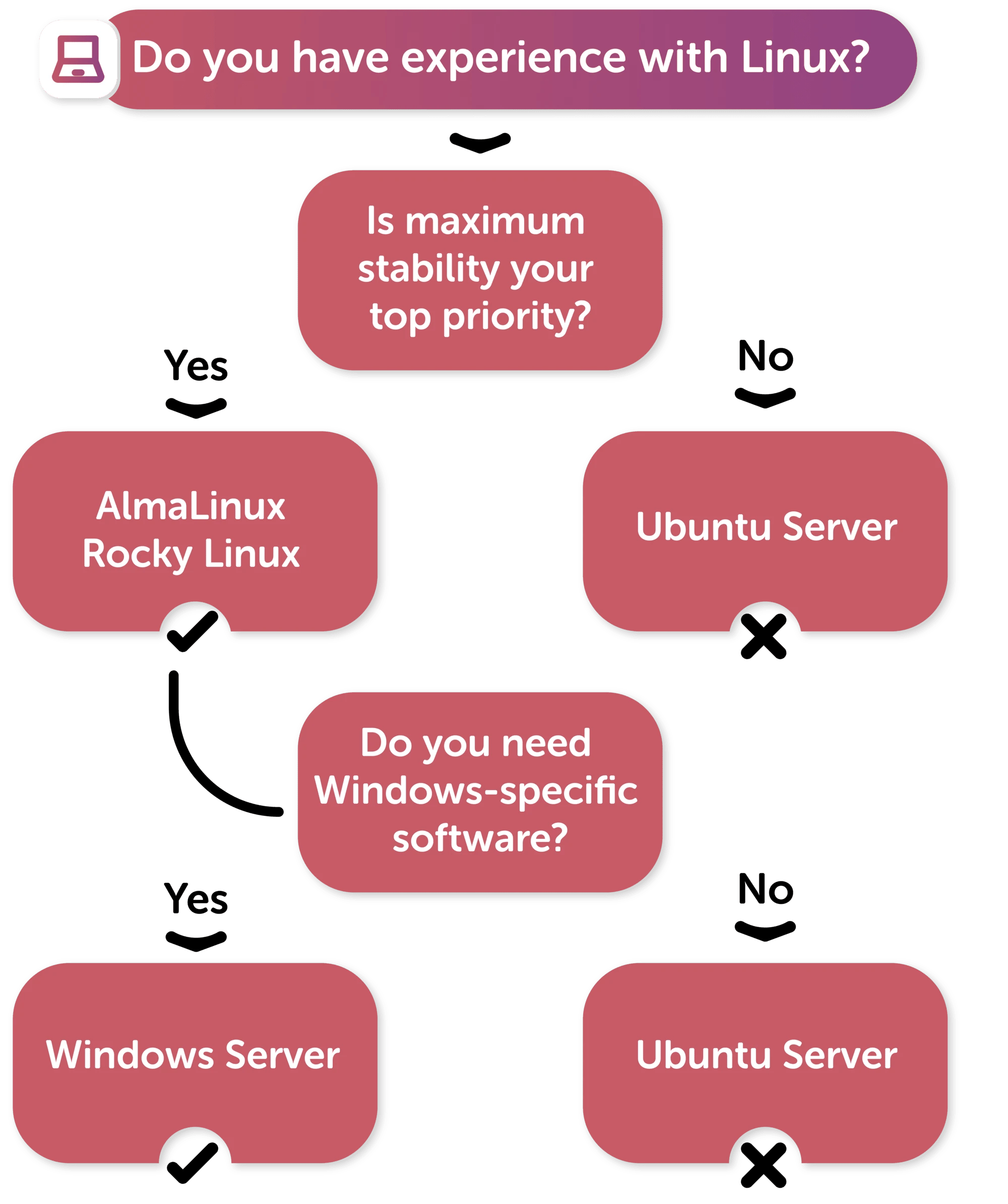In the world of web hosting, choosing the best operating system (OS) for your **dedicated server** is a crucial decision that impacts performance, security, and ease of management. The right OS serves as the foundation for your server, influencing everything from software compatibility to scalability. This guide will help you navigate the primary options—Linux and Windows—and their popular distributions, outlining the strengths and ideal use cases for each. By the end, you'll be equipped to choose the **best OS for a dedicated server** that perfectly aligns with your specific needs, whether for web hosting, game hosting, or enterprise applications.
🖥️ Windows vs. Linux: Choosing the Right Dedicated Server OS
When selecting a dedicated server OS, the choice often comes down to two major contenders: Windows and Linux. While both are highly capable, they each have distinct advantages and are suited for different environments. This table summarizes their key differences to help you make an informed decision.
| Feature | Windows Server | Linux Server |
| Cost | Paid (licensing required) | Free and open-source |
| Ease of Use | Beginner-friendly (GUI-based) | Intermediate (command-line focused) |
| Security | Strong, but requires careful configuration | Highly secure, with strong permissions |
| Software Compatibility | Excellent for Microsoft applications (.NET, MSSQL) | Broad support for open-source software (PHP, MySQL, Apache) |
| Community & Support | Strong vendor support (Microsoft) | Vast community support and documentation |
Each operating system has its place. Your choice will depend on factors like the software you plan to run, your team's expertise, and your budget. For a deeper look into a specific OS, you can explore options like a **Windows dedicated server** or a **Linux dedicated server** on our site.
🕹️ What's the Best OS for a Game Server?
When it comes to game servers, choosing the correct OS is vital for a smooth, lag-free experience. The best choice is often dictated by the game's specific requirements, community support, and your own comfort with the operating system.
Windows Server
Windows Server is a popular choice for hosting game servers, especially for titles developed on the Windows platform. Its graphical user interface (GUI) and broad support for commercial software make it an accessible option for many server administrators. Games like Minecraft, ARK: Survival Evolved, and Rust often have dedicated Windows server versions that are easy to set up and manage.
Key Features of Windows for Game Servers:
- Familiar GUI: The graphical interface simplifies management for those who are not comfortable with the command line.
- Broad Game Support: Many popular games have been developed with Windows in mind, ensuring compatibility and stable performance.
- Security Features: Windows Server includes robust security tools, but it's important to configure them properly. You can refer to our guide on 10 Security Tips for Your Dedicated Windows Server for essential practices.
Linux (Ubuntu Server, CentOS, Debian)
Linux is widely used for game servers due to its stability, performance, and resource efficiency. Many game servers, particularly those based on open-source protocols, run exceptionally well on Linux. Ubuntu Server, CentOS, and Debian are popular distributions known for their server capabilities. For a deeper dive into the two major OS types, you can read our comparison of Linux vs. Windows dedicated servers.
Customized Linux Distros
Some game server hosting companies provide specialized Linux distributions optimized for specific games. These distributions often come preconfigured and streamlined for a particular game, offering improved performance and ease of setup.
Ultimately, the choice of the best OS for a **game dedicated server** depends heavily on the specific game you intend to host. Assess the compatibility and support available, as well as your own familiarity with the operating system, to determine the best fit. For those looking to set up their own server, our dedicated server tutorials can provide step-by-step guidance. You can also explore our range of **game dedicated servers** for optimized hosting solutions.
☁️ Legacy vs. Modern OS: A Note on NetWare
Historically, NetWare was a key player in the networking world, especially for file and print services. While it's largely been replaced by modern operating systems, understanding its place in history can highlight how server needs have evolved. NetWare offered a robust, high-performance platform, but market shifts and the rise of other OSs led to its decline. Today, most discussions about the **best OS for a dedicated server** focus on contemporary options like Windows and Linux, which offer better software support, security, and community resources.
📊 The Best Operating System (OS) for Your Dedicated Servers

When choosing an OS, you're essentially picking a powerful and versatile platform. There are primarily two options: Windows or Linux. Within Linux, there are numerous distributions, each with distinct features. Let's explore the primary choices and their significant advantages.
Windows Server
Windows Server offers a robust suite of features, making it a prominent contender for enterprises that rely on Microsoft technologies. It's a leading option for those who need a user-friendly GUI and seamless integration with the Microsoft ecosystem.
Key Features of Windows Servers:
- Active Directory: Centralized management of network resources and user permissions.
- Integrated Management Tools: Tools like PowerShell and Server Manager streamline administration.
- Support for Microsoft Ecosystem: Seamlessly integrates with Microsoft applications like SQL Server and Exchange.
- Virtualization: Supports robust virtualization capabilities through Hyper-V.
Linux Servers
Linux servers, represented by a variety of distributions, offer a powerful and versatile ecosystem. Known for their open-source nature, stability, and security, Linux distributions are a popular choice for developers and businesses alike. For more on what a server is, you can read our article on **what is a dedicated server**.
Key Features of Linux Servers:
- Open-Source Nature: Fosters a vibrant community and allows for extensive customization.
- Stability and Reliability: Known for prolonged uptime, making it ideal for critical environments.
- Robust Security: Strong permissions and regular security updates.
- Flexibility: Vast customization options to tailor the OS to specific needs.
For more advanced users or businesses with specific needs, there are other hosting options to consider. A **GPU dedicated server** can provide the necessary processing power for AI and machine learning, while an **instant dedicated server** is perfect for those who need to get online fast. You can also compare different solutions, such as dedicated server vs. VPS hosting, or explore options like a managed dedicated server or an unmanaged dedicated server.
🐧 Popular Linux Distributions for Dedicated Servers
Linux distributions offer a wide range of features, each with its own strengths. Here's a look at some of the most popular choices.
Ubuntu
Ubuntu is a favored choice due to its user-friendly interface, stability, and extensive community support. Its intuitive nature makes it accessible to a wide range of users, from beginners to experienced system administrators. Ubuntu's reliability and versatility make it a great choice for web hosting, database management, and more.
Red Hat Enterprise Linux (RHEL)
RHEL is an enterprise-focused distribution that is widely regarded for its stability, security, and comprehensive support. It's built for mission-critical server environments and offers features like a defined lifecycle and stringent security measures. RHEL's subscription model includes comprehensive support, making it a trusted choice for large-scale enterprise deployments.
CentOS
CentOS (Community OS) is a popular Linux distribution derived from RHEL's open-source code. It inherits RHEL's stability and security features but is free to use and backed by a strong community. CentOS is a reliable and secure choice for users who want the benefits of an enterprise-grade OS without the licensing costs.
Debian
Debian is highly regarded for its stability, security, and commitment to free software. It is a foundational pillar in the Linux ecosystem, known for its rock-solid reliability and efficient package management through APT. Debian is a great choice for those who prioritize a secure, stable, and community-driven platform for their server applications.
💼 How to Choose the Best Server OS for Your Business
Choosing the best server OS requires careful consideration of your specific needs, budget, and future growth. Here's a step-by-step process to help you decide:
- Assess Your Requirements: Identify your business needs. Are you running a high-traffic website, managing a large database, or hosting a specific application?
- Consider Compatibility: Ensure the OS is compatible with the software and applications your business relies on.
- Evaluate Security Features: Look for an OS with robust security measures, as data protection is paramount for any business.
- Consider Ease of Management: If you don't have a dedicated IT team, an intuitive and user-friendly interface can save you time and effort.
- Review Cost and Licensing: Assess the total cost of ownership, including licensing fees and support. Open-source options like Linux can offer a significant cost advantage.
- Plan for Scalability: The chosen OS should accommodate your business's growth without requiring a complete system overhaul.
While the process is similar for small and large businesses, the scale and complexity of the requirements will differ. For large enterprises, priority is often given to comprehensive support and advanced security, while small businesses may focus more on ease of use and cost-effectiveness. For a detailed comparison of server locations, you might find our article on **how Tampa dedicated servers improve website loading speed** helpful for understanding regional advantages. We also have articles comparing Atlanta dedicated servers vs. cloud hosting and Sydney dedicated servers with global options to provide a broader perspective.
Final Conclusion
The choice of the **best operating system for a dedicated server** ultimately hinges on your specific requirements, familiarity, and the intended use of the server. Whether it's the user-friendly environment of Ubuntu, the enterprise-grade stability of RHEL, the community-driven nature of CentOS, or the robust security of Debian, the optimal choice depends on aligning these factors with your specific server needs. To explore your options further, you can visit our pages for **Cheap Dedicated Servers**, learn about **dedicated server pricing**, or even buy a server with crypto on our **buy dedicated server with Bitcoin** page. For a wider range of hardware, you can check out our dedicated server outlet. Additionally, if you are targeting a specific geographic market, we offer a range of servers, including Asia Dedicated Servers, Canada Dedicated Servers, Europe Dedicated Servers, USA Dedicated Servers, and specialized Germany Dedicated Servers and Uk Dedicated Servers.
People Are Also Reading:










